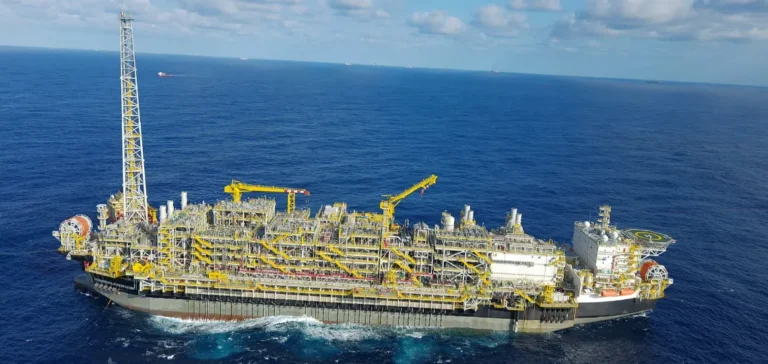Brazil’s state-controlled oil company Petrobras is seeking to expand production from its main pre-salt assets in the Santos Basin. Three floating production, storage and offloading units (FPSOs) are targeted to exceed their current contractual limits. The Almirante Tamandaré in the Búzios field, the Marechal Duque de Caxias in the Mero field, and a third unit operated by Modec are at the center of negotiations between Petrobras and their lessors.
Unprecedented ramp-up at Búzios
The FPSO Almirante Tamandaré, supplied by SBM Offshore, is the largest unit ever deployed by Petrobras. Designed to process 225,000 barrels per day (bpd) of oil and 12 million cubic meters of gas, it reached full capacity in August 2025, just six months after start-up. Petrobras now estimates that output could be lifted to 250,000 bpd, an increase of around 11%. This gain would add roughly 7.5 million extra barrels each month, directly boosting Brazil’s export flows. According to Petrobras, only five of the eight planned wells are currently connected, leaving room for further volume increases.
Mero already above nominal capacity
At the Mero field, Petrobras operates several FPSOs with a nominal capacity of 180,000 bpd each. The Marechal Duque de Caxias, delivered in late 2024, quickly reached its plateau, pushing the company to consider a higher limit. The FPSO Guanabara, operated by Modec, has already exceeded its design, hitting a record 183,000 bpd in June 2025. Together, Mero already contributes more than 500,000 bpd to Petrobras’ portfolio. The Libra consortium, which includes TotalEnergies, Shell, CNOOC, CNPC and the state-owned Pré-Sal Petróleo (PPSA), supports this output growth, which also increases the share allocated to the Brazilian state.
Pre-salt investments at the core
Búzios and Mero remain central to Petrobras’ growth strategy. Eleven FPSOs are planned for Búzios by 2030, with combined potential above 1.5 million bpd. At Mero, four units of 180,000 bpd each are scheduled in the short term, raising installed capacity beyond 720,000 bpd. Overall, Petrobras aims to lift national crude output to over 4 million bpd by 2030, up from 3.7 million in June 2025, nearly 79% of which already comes from the pre-salt.
A direct lever on exports
Brazil is already a major net exporter, with around 2.3 million barrels shipped daily in 2024. Each additional 25,000 bpd from one FPSO represents over 9 million barrels annually. At an average Brent price of $80 per barrel, this equates to more than $700 million in additional gross revenue. For Petrobras, which has committed $111 billion in investments between 2024 and 2028, these added volumes allow for faster payback of new units and funding of further drilling programs.
Talks with SBM Offshore and Modec
Charter contracts usually cap processing capacity at the certified level set at commissioning. To go beyond, Petrobras must secure agreement from partners SBM Offshore and Modec, which are paid based on availability and performance. Discussions include contractual adjustments, performance tests, and potential equipment upgrades. Sylvia dos Anjos, head of exploration and production, noted that suppliers had shown goodwill in supporting these changes.
Parallel optimization of mature fields
Beyond Búzios and Mero, Petrobras is also working to extend the production plateau of the Tupi field, currently yielding nearly 800,000 bpd. The internal program “Tupi Mais Valor” gathers more than 200 experts to evaluate new drilling options and the possible installation of an additional FPSO. Similar initiatives are underway at Sapinhoá, another major field in the Santos Basin. These efforts aim to sustain production growth while maximizing existing infrastructure.






















